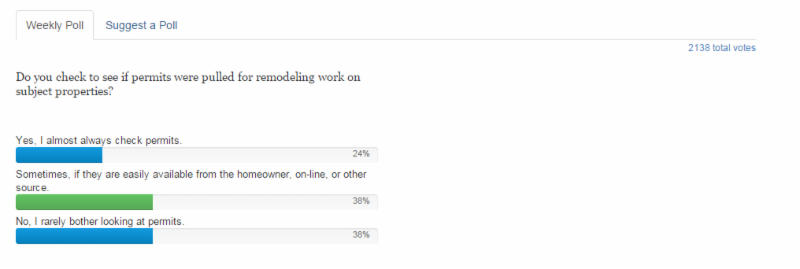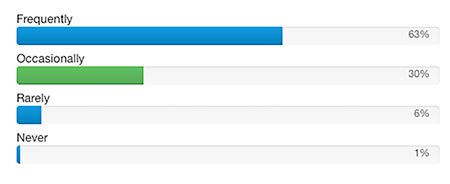To keep up on what is happening in appraisal businesses, mortgage lending, USPAP, etc. , Plus humor and strange homes, sign up for my FREE weekly appraisal email newsletter, sent since June 1994. Go to Home on the left side of the menu at the top of this page or go to www.appraisaltoday.com
Sign up in the Big Yellow Boxes
I regularly write about hot topics in appraising and appraisal business management issues
in my paid Appraisal Today monthly newsletter.
$99 per year or (credit card only) $8.25 per month, $24.75 per quarter, or $89 per year.
For more info, go to https://www.appraisaltoday.com/products
How many appraisals per week and how much time to complete an appraisal report?
This month I want to discuss three recent polls dealing with how much time it takes to complete appraisal reports and how many hours you end up working to get them all done. In the first poll, we asked “On average, how many “interior inspection” appraisals reported on a 1004 do you normally produce in a week?” This poll was very popular with 4945 responses. There was a clear winner with the response of “4-6 appraisals per week” pulling in 44 percent of the vote. The next most popular answer of “7-9 appraisals per week” took quite a drop and only pulled in 20 percent vote. The last two available answers were those at either end of the scale and they were almost tied. A few appraisers really crank out the orders because 16 percent responded that they do “10 or more” appraisals per week. On the opposite end were those representing 17 percent of the vote who only complete “1-3” appraisals per week. My guess is that many of the people in this group may be semi-retired but like to keep active in the profession while making some extra money. Of course, any individual’s volume is going to depend a great deal on their specific geographic area and general complexity of their assignments.
In the next poll we asked: “On average, how long does it take you to complete a 1004 interior inspection appraisal report including inspection time (excluding driving time)?”
This was another popular poll with 4836 responses. The winner here was “4-5 hours” with 39 percent of the vote. Not far behind was “6-7 hours” with a 29 percent share of the vote. From here the numbers dropped substantially with 13 percent of appraisers going with the response of “8-9 hours”. That is really getting to be painful when it’s taking that long to finish each assignment. The most extreme answers both received the lowest number of votes. “More than 9 hours” was the choice of 8 percent of the appraisers with the final 10 percent going for the answer of “2-3 hours”. My guess is that the appraisers in that final group really have their system down to a science and fully utilize all the available technology.
Finally, we asked, “On average, how many hours per day do you spend working on appraisals and appraisal-related business?” This poll was the most popular of the three with a total of 5451 responses. The winner was “9-10 hours” with 37 percent of the vote. The second most popular answer with 23 percent pushed the level up to “11-12 hours”. The old standard workday of “7-8 hours” came in a distant third gathering only 17 percent of the vote. Not far behind were the 15 percent who really “burn the midnight oil” working “13 or more hours” per day. Only 9 percent work “6 hours or less” each day with most of these appraisers reporting at least 5-6 hours worked per day. It’s clear, and not at all surprising, that most appraisers are working very long hours there days.
My comment: Appraisers are working long hours now because appraisal volume is way up. If you are willing to work for low AMC fees you can get as much work as you want. I would have liked to see how many hours per week. I suspect many appraisers are working 6-7 days a week. I did, during previous boom times. These polls do not include time spent on revisions. I have some data below on that. Plus, the amount of time returning update requests – answering phone calls and emails.
============================================
How much time is spent on revisions?
From the November 2014 Appraisalport newsletter
On average, how much time do you spend making and delivering requested revisions on any given appraisal?@ We had a total of 4870 responses to this poll. Nearly half (48%) of those chose the response of A10-30 minutes.@ This would seem about right for most minor to moderate revisions. Many must be making pretty minor revisions because the second most popular response with 24 percent of the vote was under 10 minutes@. Another 18 percent are having to take a bit more time and went with the choice of A31-60 minutes.@ A smaller group of 7 percent is having to invest some real-time to make the revisions and picked the response of over an hour.@ The final 3 percent selected the answer of AI to make revisions.@ I=m not sure if that means they are doing an amazing job on every report and never get a request or if they just refuse to do any revisions!
My comment: Lots of appraisers complain about excessive revision requests, but this poll indicates that appraisers aren’t spending much time on them. The time may have increased since 11/14.
—————————-
How often have you received revision requests that have no contributory value to the report, or were already addressed in the report commentary?” Sept 7 poll –
www.fncinc.com received 3,273 votes
Appraisal Humor
Appraisal business tips
A very, very funny appraiser video!



